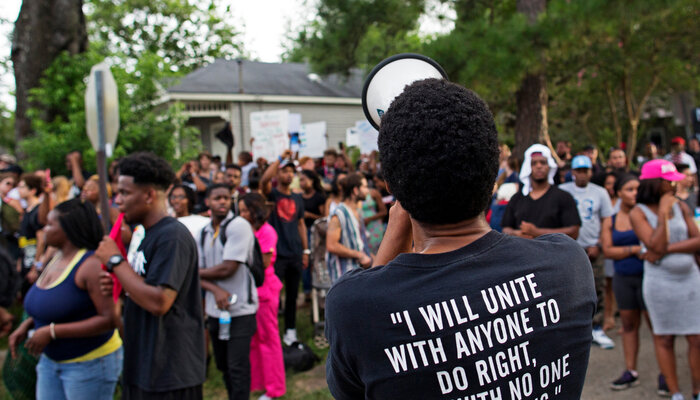A federal appeals court recently ruled that a protest leader can be sued for injuries caused by a different protester during a demonstration, even when the leader did not direct, encourage, or even approve of the actions involved. The 2–1 decision in the case, Doe v. Mckesson, manufactured a legal loophole large enough to swallow First Amendment rights. To get there, the court disregarded long-settled law and twisted or ignored Supreme Court precedents.
In 2016, civil rights activist DeRay Mckesson led a demonstration outside Baton Rouge’s police headquarters to protest the police killing of Alton Sterling. Police met protesters with a line of officers in riot gear in front of a group of regular uniformed officers that included Officer John Doe, who was granted anonymity in this suit. A protester — not Mckesson — threw a rock that hit Doe in the face and caused serious injuries. The officer, unable to identify his attacker, sued Mckesson in federal court for damages. After years of procedural maneuvering, covered in great detail by Vox’s Ian Millhiser, the Fifth Circuit Court of Appeals determined that Doe can sue Mckesson for “creating circumstances in which it is foreseeable that another will be injured.” In other words, for organizing the protest in such an allegedly negligent manner that it led directly to people being hurt.
Federal courts have a strong history of guarding political expression against all manner of legal attacks. The Supreme Court has made it clear that the First Amendment provides protection against both private lawsuits and government prosecution for the right to organize and to participate in protests. But the appeals court determined that some of Mckesson’s actions fell outside the robust protections of the Bill of Rights. As a matter of law, the First Amendment does not protect certain types of expression, including speech that will immediately and inevitably cause harm, like the person falsely shouting “Fire!” in a crowded theater.
According to the officer’s complaint, while leading the protest Mckesson failed to prevent some participants from looting water bottles from a grocery store and throwing them at police, and then led protesters into the streets around the station. This, the court concluded, “create[d] an unreasonable risk that one protester would assault or batter Doe.”
As Millhiser and other commentators explain, the Supreme Court has established just three exceptions to the First Amendment’s protections against civil liability. None of them appears in this case. That did not stop the Fifth Circuit from ruling that Mckesson’s violation of traffic laws — his literal taking to the streets — made him directly responsible for Doe’s injuries.
This decision is a frontal assault on the freedom of speech and assembly. In his dissent, Judge Don Willett correctly observes that this rule would have rendered Martin Luther King Jr. liable for property damage that occurred during his final march, which turned violent. Woolworth’s could have sued Student Nonviolent Coordinating Committee sit-in protesters for damage to the “Whites Only” lunch counters because they “created a dangerous situation” by disregarding the segregated seating policy and causing themselves to be beaten. The majority’s reasoning would have stopped the civil rights movement in its tracks.
If allowed to stand, the ruling will chill the exercise of protest rights across the states covered by the Fifth Circuit — Mississippi, Louisiana, and Texas — by threatening organizers with personal liability for events outside their control. The opinion is so untethered from settled law that it is hard to resist the conclusion that the court punished Mckesson because of who he is: a Black Lives Matter activist protesting police violence.
And a federal appeals court’s willingness to go to such lengths to avoid protecting clearly established rights prompts further, unsettling questions. If law enforcement uses excessive force to quash a demonstration, will the Fifth Circuit protect the protesters’ rights?
This antidemocratic ruling represents an immediate threat to the First Amendment rights of millions of Americans, and it shows why these fundamental rights must be consistently upheld in a wide array of circumstances, no matter who the protesters are. The Supreme Court considered the case but declined to rule on the merits in 2020, and Mckesson will likely ask the Court to consider it again. The justices should take the case, repudiate the Fifth Circuit’s dangerous error, and vindicate the right to protest.






